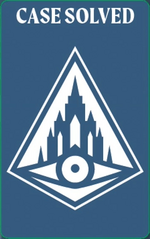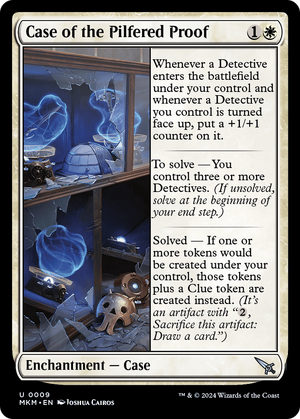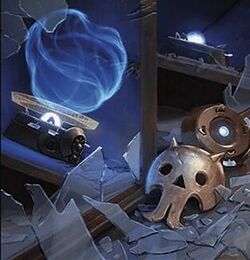Case: Difference between revisions
>BarGamer m (Put the References back where they belong, UNDER the title. Sorry again.) |
>RivalRowan (I feel like this ruling is a bit pointless but if MaRo's answering it on Blogatog and the set hasn't been released yet, it probably needs to be listed.) |
||
| Line 30: | Line 30: | ||
*To solve a Case, its "to solve" condition must be true both as its controller's end step begins and as the "to solve" ability tries to resolve. | *To solve a Case, its "to solve" condition must be true both as its controller's end step begins and as the "to solve" ability tries to resolve. | ||
*"Solved — [Triggered ability]" means "[Triggered ability]. This ability triggers only if this Case is solved." Triggered abilities use the word "when," "whenever," or "at." They're often written as "[Trigger condition], [effect]." | *"Solved — [Triggered ability]" means "[Triggered ability]. This ability triggers only if this Case is solved." Triggered abilities use the word "when," "whenever," or "at." They're often written as "[Trigger condition], [effect]." | ||
*"Solved — [static ability]" means "As long as this Case is solved, [static ability]." Static abilities are written as statements, such as "Creatures you control get +1/+1" or "Instant and sorcery spells you cast cost {1} less to cast." | *"Solved — [static ability]" means "As long as this Case is solved, [static ability]." Static abilities are written as statements, such as "Creatures you control get +1/+1" or "Instant and sorcery spells you cast cost {{1}} less to cast." | ||
*"To solve" abilities will check for their condition twice: once when the ability would trigger, and once when it resolves. If the condition isn't true at the beginning of your end step, the ability won't trigger at all. If the condition isn't true when the ability resolves, the Case won't become solved. | *"To solve" abilities will check for their condition twice: once when the ability would trigger, and once when it resolves. If the condition isn't true at the beginning of your end step, the ability won't trigger at all. If the condition isn't true when the ability resolves, the Case won't become solved. | ||
*Once a Case becomes solved, it stays solved until it leaves the battlefield. | *Once a Case becomes solved, it stays solved until it leaves the battlefield. | ||
| Line 37: | Line 37: | ||
*Cases don't lose their other abilities when they become solved. | *Cases don't lose their other abilities when they become solved. | ||
*Being solved is not part of a permanent's copiable values. A permanent that becomes a copy of a solved Case is not solved. A solved Case that somehow becomes a copy of a different Case stays solved. | *Being solved is not part of a permanent's copiable values. A permanent that becomes a copy of a solved Case is not solved. A solved Case that somehow becomes a copy of a different Case stays solved. | ||
* | *An unsolved Case will check if it has been solved on each turn it is in play, not just the turn it was cast.<ref>{{EzTumblr|https://markrosewater.tumblr.com/post/740718896696393728/|title=I got this real nitpick of a player who insists that you have to solve Cases the turn you cast it, not on a future turn.|January 27, 2024}}</ref> | ||
==References== | ==References== | ||
{{reflist}} | {{reflist}} | ||
Revision as of 09:58, 28 January 2024
| Case | |
|---|---|
| Enchantment Type | |
| (Subtype for enchantment cards) | |
| Statistics |
13 cards |
| Scryfall Search | |
| type:"Case" | |
Case is an enchantment type to be introduced in Murders at Karlov Manor.[1][2] They represent mysteries to solve, and are the third card type type to use the vertical art and rules text design.
Description
Cases are a variation on Sagas and Classes that take after the design of Quests, but with integrated rules rather than using quest counters.

Cases have three abilities, listed from top to bottom. The first ability is a standard ability, which has no additional rules attached to it. This ability is always active for its controller, regardless of whether or not the case is solved.
The second ability is the "To solve" ability: it lists an intervening "if" condition for the player to achieve. The "to solve" ability triggers during its controllers end step but only if the condition has been met. Spelt out, it would read "At the beginning of your end step, if [condition], this Case is solved".
The third ability is the "Solved" ability, which only takes effect if the case is marked as "solved". These implicitly have "Activate this ability only if [card name] is solved." or "As long as [card name] is solved, X". While players may mark these enchantments with counters to remind themselves of these changes of state, being solved is a designation that is either true or not and does not rely on external markers, much like Classes.
A punch card with "Case Solved" indicators appears in booster packs for Murders at Karlov Manor.[3]
Rules
Rulings

- The first ability of a Case is always active.
- Each Case has two special keyword abilities: to solve and solved.[4]
- "To Solve — [condition]" means "At the beginning of your end step, if [condition] and this Case is not solved, it becomes solved."
- The meaning of "solved" differs based on what type of ability follows it. "Solved — [activated ability]" means "[Activated ability]. Activate only if this Case is solved." Activated abilities contain a colon. They're generally written "[Cost]: [Effect]."
- To solve a Case, its "to solve" condition must be true both as its controller's end step begins and as the "to solve" ability tries to resolve.
- "Solved — [Triggered ability]" means "[Triggered ability]. This ability triggers only if this Case is solved." Triggered abilities use the word "when," "whenever," or "at." They're often written as "[Trigger condition], [effect]."
- "Solved — [static ability]" means "As long as this Case is solved, [static ability]." Static abilities are written as statements, such as "Creatures you control get +1/+1" or "Instant and sorcery spells you cast cost
 less to cast."
less to cast." - "To solve" abilities will check for their condition twice: once when the ability would trigger, and once when it resolves. If the condition isn't true at the beginning of your end step, the ability won't trigger at all. If the condition isn't true when the ability resolves, the Case won't become solved.
- Once a Case becomes solved, it stays solved until it leaves the battlefield.
- As long as it's solved, its "to solve" ability won't trigger again.
- A Case remains solved even if another player gains control of it.
- Cases don't lose their other abilities when they become solved.
- Being solved is not part of a permanent's copiable values. A permanent that becomes a copy of a solved Case is not solved. A solved Case that somehow becomes a copy of a different Case stays solved.
- An unsolved Case will check if it has been solved on each turn it is in play, not just the turn it was cast.[5]
References
- ↑ Matt Tabak (January 16, 2024). "Murders at Karlov Manor Mechanics". magicthegathering.com. Wizards of the Coast.
- ↑ Mark Rosewater (January 22, 2024). "Getting Away with Murders at Karlov Manor, Part 2". magicthegathering.com. Wizards of the Coast.
- ↑ Murders At Karlov Manor Debut Aftershow. (Video). Magic: The Gathering. YouTube (January 16, 2024).
- ↑ Eric Levine (January 25, 2024). "Murders at Karlov Manor Release Notes". magicthegathering.com. Wizards of the Coast.
- ↑ Mark Rosewater (January 27, 2024). "I got this real nitpick of a player who insists that you have to solve Cases the turn you cast it, not on a future turn.". Blogatog. Tumblr.
